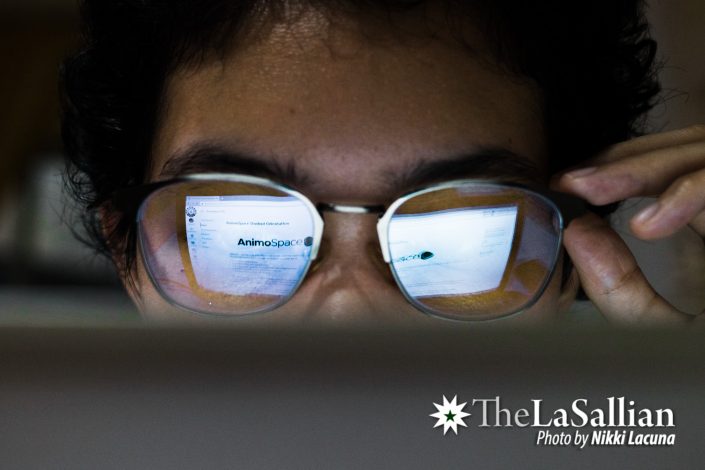As the final term of the Academic Year (AY) shifts into full gear, uncertainty continues to loom over DLSU. Adjusting to changes brought by the pandemic began well before Term 3, with the policies set by the Academics Council last Term 2 of AY 2019-2020 beset with criticism—if not direct challenges—from students regarding the effectiveness of online learning.
Vice Chancellor for Administration Dr. Arnel Uy, meanwhile, assures that DLSU is overseeing not only students’ compliance with completing all the requirements but more importantly their learning process.
Making an entrance
In an unprecedented move, the University announced last May 29 that ID 120 students would be able to enroll by Term 3 of this AY—a term ahead of schedule—joining the cadre of students participating in online learning.
Under the early enrollment program, ID 120 students were given the option to enroll for online learning for basic and general education courses without prerequisites. “Parang nagkaroon ka lang ng advanced summer term…but this time it’s actually for the freshmen lang,”
says Uy.
(It would be similar to having an advanced summer term.)
He adds that the new students are not expected to enroll in full 18 or 21-unit loads, which he admits is “going to be very difficult” in an online environment, especially for students just stepping into the foray of tertiary education. According to Vice Chancellor for Academics Dr. Robert Roleda, almost 2,000 frosh have enrolled for Term 3—half of the expected full intake of ID 120 students.
Circling the drain
Projections offered by the University Student Government last February claimed that undergraduate enrollment figures “may exceed 10,000 students” for AY 2020-2021. However, as the pandemic situation developed, DLSU had anticipated enrollment numbers to drop significantly for Term 3, confirms Dr. Antonio Contreras, President of the Association of Faculty and Educators of DLSU Inc. (AFED), in an interview with The LaSallian.
As such, administrators had been considering the need to initiate what Contreras describes as “belt-tightening measures”, but the anticipated decrease did not materialize. Based on current estimates, about 90 percent of old students have already re-enrolled for Term 3, according to Roleda.
While familiar faces remain, many of the physical features and components of educational delivery have changed with the shift to the virtual realm, with no laboratory fees being charged for online laboratory classes, for example. Additionally, the University moved to grant a seven percent tuition rebate for Term 2, a 20 percent discount for Term 3 tuition, and a 32 percent reduction in Term 3 miscellaneous fees.
The AFED President discloses that this was possible partly due to DLSU incurring some savings, despite the institution’s precarious financial situation prior to the pandemic. Utility billings for example, reportedly in millions, have been leveled. Additionally, budget allocations intended for team building activities and employee outings were redirected to connectivity support to facilitate online educational delivery modes.

Reviewing new arrangements
The current crisis has accelerated the shift to online learning, according to Uy, with University administrators expecting the online mode to be incorporated even in the next few years.
Not all students have the means to adjust perfectly to online mode, however; adjustments to accommodate and support both ID 120 and upper batches are thus even more necessary to ensure the delivery of educational services. In response, the Office of Student Affairs, together with the University Student Government, recently launched the Lasallian Student Welfare Program (LSWP) to extend assistance to students, including the incoming frosh.
Under this program is the Student Emergency Relief Fund, which provides short-term subsidies for use in times of emergency, as well as transportation and food allowance for students in need.
The LSWP also covers technology support, offering three options—Computer Loan to fund laptop or personal computer purchases for the grantees; Computer Grant to provide new or refurbished computers; and Internet Connect to partially or fully subsidize internet connection costs.
At least 100 students will be provided with connectivity support for the entire term, while 25 more will be given loans and grants for computers, explains Dean of Student Affairs Nelca Villarin.
Partnerships with technology and internet service providers are also being pursued to give students greater access to affordable internet plans, she adds.
Additionally, University administrators are still on top of salient concerns, promises Roleda. Students who have remaining laboratory units required in their programs, for example, may see “changes [in their] flowchart so that some of the [laboratory] classes can be moved to later terms,” the VCA elaborates. Although the University cannot accommodate sufficient laboratory classes at this time, he mentions that they are still hoping that some can be offered for graduating students who need to take those courses.
For deferred Term 2 classes, Roleda says that students can take makeup laboratory classes on Fridays and Saturdays of weeks 11 and 12—the expected period designated for face-to-face sessions this third term should conditions permit. “There [would be] no others using [the laboratories during that time], so magagawa ‘yung [laboratory] classes for Term 2,” he assures.
(Laboratory classes can be conducted during that time.)
Continuous efforts from the University are underway as online learning continues, emphasizes Uy, “It’s actually a multi-faceted situation. Given [the pandemic], we are preparing at least to ensure that we deliver online classes, and we [want to] deliver in a way that will not lower the standards or quality of learning.”
